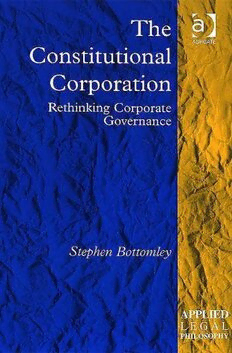
The Constitutional Corporation: Rethinking Corporate Governance (Applied Legal Philosophy) PDF
200 Pages·2007·0.948 MB·English
Most books are stored in the elastic cloud where traffic is expensive. For this reason, we have a limit on daily download.
Preview The Constitutional Corporation: Rethinking Corporate Governance (Applied Legal Philosophy)
Description:
Share ownership has become a major aspect of western economies and there are diverse views on its role. While corporate law is based on the idea that shareholders are the primary concern of company directors, more radical writers have suggested that public company shareholders are passive investors whose interests detract from the interests of employees or victims of corporate wrongdoing. This book argues that, rather than thinking of shareholders as passive investors, they should be given opportunities to be active members of corporations and that these corporations are, in fact, constitutional arrangements. This means that companies are decision-making organisations in which questions of process and structure are important. Instead of using 'efficiency' as the guiding criterion, it is argued that corporate structures and process should be assessed by referring to the ideas of 'deliberation', 'accountability' and 'contestability'.
See more
The list of books you might like
Most books are stored in the elastic cloud where traffic is expensive. For this reason, we have a limit on daily download.
